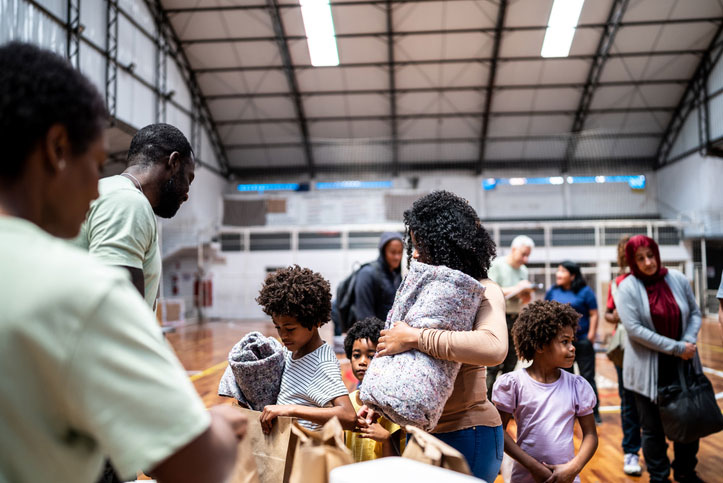Created by Illinois Social work EDU Contributing Writer

Illinois is home to 1.8 million immigrants, totaling 14% of the state population. This includes refugees from Burma, the Democratic Republic of Congo, Ukraine, Iraq, and Afghanistan. Like the rest of the country, refugees, asylum seekers, and migrants are searching for a better life, often escaping violent crime, food disparities, education deficits, and health care shortages in their native countries. Many have found their way to Illinois, either by choice or recent busing policies of southern states. Immigration social workers are crucial advocates for the safety and welfare of new arrivals.
The demographic of Illinois’ immigrant population is in a current state of change. Chicago’s Asian population increased by 31% in a ten-year period. According to the 2020 Census, Asians were the highest-growing racial or ethnic group to populate the Chicago area. Since then, there’s been a sharp increase in immigrants from South and Central America. Texas has bussed tens of thousands of immigrants from the Mexican border to the Chicago area. Every month, more immigrants arrive from border towns. According to the city of Chicago, Chicago has welcomed over 30,000 new arrivals in the fifteen months since August 2022.
This spike in population has created a health and housing crisis for Latin American immigrants in the Chicago area, where social workers are in desperate need. Springfield lawmakers have been working to provide the funding and legislation necessary to help the recent influx of immigrants to Illinois. Aid has been promoted in a three-phase approach called Welcome, Shelter, Independence. In November of 2023, the governor of Illinois announced an additional $160 million in resettlement aid to immigrants arriving in Illinois, including $65 million to “winterize” temporary shelters.
Chicago’s Office of Immigrant, Migrant, and Refugee Rights highlights how the city feels about immigration, quoting Mayor Johnson: “Chicago will always be a welcoming city and a champion for the rights of our immigrant and refugee communities.”
Becoming an Immigration Social Worker in the Prairie State
Aspiring immigration social workers usually obtain an accredited bachelor’s degree in social work (BSW) from an accredited institution, though some start their education in a related bachelor’s degree program. A BSW normally requires four years to complete.
To become a Licensed Social Worker (LSW), candidates must obtain an accredited BSW and complete many hours of supervised clinical professional experience or have obtained an MSW that includes similar internship experience as part of their degree completion.
To become a Licensed Clinical Social Worker (LCSW), an accredited master’s degree in social work (MSW) along with supervised clinical professional experience is required.
The Council on Social Work Education (CSWE) can help guide prospective candidates to qualified accredited academic institutions.
Illinois requires all social workers to obtain licensure. The National Association of Social Workers (NASW), Illinois chapter, provides steps towards licensure for both LSWs and LCSWs. LSWs are no longer required to take an exam.
Continuing Education Units (CEUs) are required to renew licensure.

Advancing a Career in Immigration Social Work
Immigration social workers can excel at their ability to help their clients by continuing their education in several areas, including:
- Foreign Language Training
- Trauma-Informed Care
- Sex-Trafficking & Abuse Prevention
- Asylum Medicine
- Forensic Documentation
- Suicide Prevention
- Cultural Humility
- Creativity and Self-Expression
The Role of the Immigration Social Worker in Present-Day Illinois
The Illinois Department of Human Services (IDHS) lists social workers as a “High Need” title, meaning they are looking to fill job openings due to growing demand.
On November 2nd, 2023, the AP reported that the health care needs of immigrants are so great in the Chicago area that medical volunteers are being asked to help ease the crisis. Many of these volunteers are well-meaning medical students who may not be properly trained in immigrant assistance resources that a licensed social worker could provide.

Medical volunteers are often utilized for immediate aid like wound care, prenatal vitamins, and acute infections. Yet, the complexity of immigrant needs in Illinois goes beyond initial on-site health care. Qualified social workers are needed to provide resources and referrals for:
- Long-Term Housing
- Legal Aid
- Mental Health Care
- Job and Career Development
- Food Assistance
- Education
- Transportation
- Personal Care
Refugees need help navigating the asylum process and how to qualify for work permits. Immigration social workers attend to the human rights of immigrants as well. Differences in race and ethnicity can lead to discrimination. Social workers provide invaluable connections to organizations that help protect immigrants’ political and civil rights.
Further immigration social worker duties may involve assisting immigrants with scheduling and attending appointments with social service and medical providers, sometimes aiding in transportation.
Illinois Immigration and Refugee Organizations and Programs
Illinois has a vast network of support for immigrants, refugees, and asylum seekers. Qualified social workers are equipped to share these resources with new arrivals and coordinate services on their behalf. The IDHS manages a comprehensive list of support services.
Illinois Welcoming Center (IWC)
The IWC provides necessary “comprehensive and holistic case management and service coordination to immigrants and refugees in a linguistically, culturally sensitive manner.” This resource provides services such as:
- Health Care
- Food Assistance
- Counseling
- Chicago CityKey ID Assistance
- Community Workshops
- Education
- Housing
- Medical Application
CityKey ID
CityKey is a free, optional government-issued ID card available to all Chicagoans, regardless of immigration status. This card serves as a:
- Government-issued Identification
- Chicago Transit Authority Ventura Card
- Chicago Rx Prescription Discount Card
- Chicago Public Library Card
Refugee Program
Also called the Refugee Resettlement Program, the IDHS counts on the help of immigration social workers to inform refugees of assistance available to them by local resettlement agencies, such as organizations that offer to host immigrant families within the community.
Victims of Trafficking, Torture, & Other Serious Crimes (VTTC)
IDHS’ Victims of Trafficking, Torture, & Other Serious Crimes (VTTC) sector relies on the expertise of social workers to guide individuals through the process of applying for Medicaid, VTTC Food Assistance, and VTTC Cash Assistance.
All Kids
Qualified social workers aid immigrant families seeking health care for their children under the All Kids program within the Illinois Department of Healthcare and Family Services (HFS).
Immigration Legal Services
Social workers can effectively warn immigrants and refugees about fraudulent immigration providers while steering them toward legitimate legal aid resources.
Illinois Access to Justice provides “education, outreach, and legal representation to historically marginalized communities impacted by deportation and incarceration.”
2022 US Bureau of Labor Statistics job market trends and salary figures for child, family, and school social workers, healthcare social workers, mental health and substance abuse social workers, and social workers (all others) are based on national data, not school-specific information. Conditions in your area may vary. Data accessed January 2024.
Discover more about other social work specializations in Illinois.





